FC Dynamo Moscow
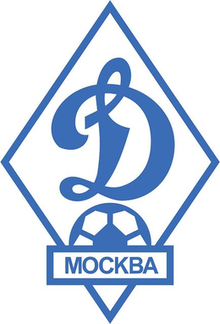 | |||
| Full name |
Футбольный клуб Динамо Москва (Football Club Dynamo Moscow) | ||
|---|---|---|---|
| Nickname(s) |
Belo-golubye (White-blues) Dinamiki (Loudspeakers) Musora (Cops) | ||
| Founded | 18 April 1923 | ||
| Ground | Arena Khimki | ||
| Capacity | 18,636 | ||
| Owner | VTB Bank | ||
| Chairman | Yevgeni Muravyov | ||
| Manager | Yuriy Kalitvintsev | ||
| League | Russian Football National League | ||
| 2015–16 | Russian Football Premier League, 15th (relegated) | ||
| Website | Club home page | ||
|
| |||
FC Dynamo Moscow (Dinamo Moscow, FC Dinamo Moskva,[1] Russian: Дина́мо Москва́ [dʲɪˈnamə mɐˈskva]) is a Russian football club based in Khimki, Moscow Oblast, currently playing in the Russian Football National League.
Dynamo is the oldest Russian football club and it was the only one that has always played in the top tier of Soviet football (along with Dynamo Kyiv) and of Russian football from the end of the Soviet era to 2016. Despite this, it has never won the modern Russian Premier League title.
During the Soviet era, it was affiliated with the MVD (Ministry of Internal Affairs – The Soviet Militia) and with the KGB[2][3] and was a part of Dynamo sports society. Chief of the Soviet security and secret police apparatus NKVD, Lavrentiy Beria, was a patron of the club until his downfall.
From 10 April 2009 the VTB Bank has been the owner of Dynamo after acquiring a 74% share in the club.[4] Boris Rotenberg Sr. was chairman until he resigned on 17 July 2015.[5]
Dynamo's traditional colours are blue and white. Their crest consists of a blue letter "D," written in a traditional cursive style on a white background, with "Moscow" written below it, partially covering a football underneath. The club's motto is "Power in Motion," initially proposed by Maxim Gorky, the famous Russian author, who was once an active member of the Dynamo sports society.
History

Dynamo Moscow has its roots in the club Morozovtsi Orekhovo-Zuevo Moskva founded as a factory team in 1887. The team was renamed OKS Moskva in 1906 and won a series of Moscow league championships from 1910 to 1914.
After the Russian Revolution, the club eventually found itself under the authority of the Interior Ministry and its head Felix Dzerzhinsky, chief of the Cheka, the Soviet Union's secret police. The club was renamed Dynamo Moscow in 1923 but was also referred to disparagingly as "garbage", a Russian criminal slang term for "police", by some of the supporters of other clubs.
Dynamo won the first two Soviet Championships in 1936 and 1937, a Soviet Cup in 1937, and another pair of national titles in 1940 and 1945. They were also the first Soviet club to tour the West when it played a series of friendlies in the United Kingdom in 1945. Complete unknowns to the British, the Soviet players first drew 3–3 against Chelsea and then defeated Cardiff City 1–10. They defeated an Arsenal side reinforced with Stanley Matthews, Stan Mortensen and Joe Bacuzzi by a score of 3–4 in a match played in thick fog at White Hart Lane. They drew 2–2 against Scottish side Rangers.
They continued to be a strong side at home after World War II, and enjoyed their greatest success through the 1950s. Dynamo captured another five championships between 1949 and 1959, as well as their second Soviet Cup in 1953. Honours were harder to come by after that time. The club continued to enjoy some success in the Soviet Cup, but has not won a national championship since 1976. Even so, Dynamo's 11 national titles make it the country's third-most decorated side behind Dynamo Kyiv (13 titles) and Spartak Moscow (12 titles).
Dynamo's greatest achievement in Europe was in the 1971–72 European Cup Winners' Cup, where they reached the Final at Camp Nou in Barcelona, losing 3–2 to Rangers. This was the first time a Russian side had reached a final in a European competition, a feat not repeated until CSKA Moscow won the UEFA Cup in 2005.
VTB Bank era (since 2009)
At the end of the 2008 season, Dynamo finished third, qualifying for the 2009–10 Champions League preliminary round. On 29 July 2009, Dynamo recorded a 0–1 away win against Celtic at Celtic Park,[6] which gave them a strong advantage going into the second leg. However, Celtic comfortably defeated Dynamo 0–2 in Moscow to progress,[7] sending Dynamo into the Europa League play-off round where the club was eliminated by Bulgarian side CSKA Sofia after a 0–0 away draw in Sofia and a 1–2 home defeat in Moscow.
In 2012, after a poor start to the season in which it lost its first five league games, Dynamo replaced interim manager Dmitri Khokhlov with the Romanian Dan Petrescu, who managed to pull the club out of the relegation zone into a position in the upper-half of the league table. The team was close to qualifying for a place in European competition, but a failure to win in the last matchday left them in seventh, two points below the last Europa League qualifier position. Despite his efforts, Petrescu's contract was terminated on 8 April 2014 by mutual agreement after a heavy loss to league outsiders Anzhi Makhachkala 0–4.[8] As Dynamo Director of Sports Guram Adzhoyev stated, "Last year Dan drew the team from the complicated situation, lifted it to the certain level, but recently we have seen no progress."[9] Petrescu was replaced by Stanislav Cherchesov as manager. Under his management, Dynamo qualified for the group stage of the 2014–15 UEFA Europa League in which they won every game before falling to Napoli in the Round of 16. Dynamo was only able to finish in fourth place in the 2014–15 season after a string of poor results in the latter stages.
In June 2015, Dynamo was excluded from 2015–16 Europa League competition for violating Financial Fair Play break-even requirements.[10][11] As a result, VTB Bank proposed to transfer 74 percent of the shares of the club to the Dynamo sports society. Under the proposed plan, the society would own 100 percent of shares of Dynamo as it did in 2009, while the shares of the VTB Arena would still be held by the Bank. The move would allow the club to comply with the requirements of Financial Fair Play, and VTB Bank would continue to provide support to Dynamo to the extent consistent with Financial Fair Play regulations.
Manager Stanislav Cherchesov was replaced by the returning Andrey Kobelev, and many foreign players, such as Mathieu Valbuena, Balázs Dzsudzsák and Kevin Kurányi, subsequently left Dynamo. Several young Dynamo prospects, such as Grigori Morozov, Aleksandr Tashayev and Anatoli Katrich, who won the Under-21 competition in the 2014–15 season, were introduced to the first-team squad.
On 22 December 2015, Chairman of Dynamo's board of directors Vasili Titov announced that the shares had not been transferred to the Dynamo society; that FFP compliance rather than the share transfer was the top priority for the club; and that he expected the club to achieve compliance by April 2016.[12]
After the winter break of the 2015–16 season, the club results got much worse. Dynamo won only one game out of 12 played in 2016, Kobelev was fired with 3 games left, and on the final day of the season, Dynamo lost 0-3 to FC Zenit St. Petersburg at home, dropped to 15th place in the table and was relegated from the Premier League for the first time in history.
In October 2016, with Dynamo leading the second-tier Russian Football National League at the time, the newly appointed club president Yevgeni Muravyov claimed that club's debts stand at 13 billion rubles (approximately 188 million euros) and unless a new owner is found shortly or VTB re-commits to covering the club's debts, the club might declare bankruptcy. That would most likely mean the loss of professional license and relegation to the fourth-level Russian Amateur Football League.[13]
Rivalries
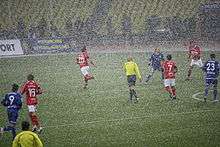
Since its establishment in 1923, Dynamo's historical rival has been Spartak Moscow. Clashes between the clubs were seen by their fans and more generally as the most important games in the Soviet Union for more than three decades, attracting thousands of spectators. (Ironically, however, on New Year's Day in 1936, it was a combined Dynamo-Spartak team that traveled to Paris to face Racing Club de France, then one of Europe's top teams.) Dynamo clinched the first-ever Soviet League by beating Spartak 1–0 at Dynamo Stadium in front of 70,000 spectators. Spartak responded by winning the championship the following year. But after Dynamo's decline in the late 1970s, the rivalry has faded. Since the collapse of the Soviet Union, first CSKA Moscow and then Zenit Saint Petersburg have emerged as the top clubs in Russian football, with the rivalries between Dynamo and its Moscow neighbours such as Spartak Moscow and Lokomotiv assuming less significance.
Stadium
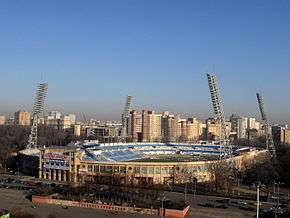
Dynamo's ground used to be the historic Dynamo Stadium in Petrovsky Park, which seats 36,540. In 2008, it was closed for demolition. It is to be replaced by VTB Arena in 2017, which will have a capacity of 27,000 (adjustable up to 45,000). Until its completion, Dynamo has been sharing Arena Khimki with rivals CSKA Moscow since 2010, before the new ground for the latter, Arena CSKA, was completed in 2016.
Average attendance
|
|
|
Honours
- Champions (11): 1936 (spring), 1937, 1940, 1945, 1949, 1954, 1955, 1957 1959, 1963, 1976
- Runners-up (11): 1936 (autumn), 1946, 1947, 1948, 1950, 1956, 1958, 1962, 1967, 1970, 1986, 1994
- Winners (7): 1937, 1953, 1967, 1970, 1977, 1984, 1994-95
- Runners-up (8): 1945, 1949, 1950, 1955, 1979, 1996-97, 1998-99, 2011-12
- Winners: 1973, 1981, 1986
- Runners-up: 1971-72
- Winners: 1976
League and cup history
Season Div. Pos. Pl. W D L GS GA P Domestic Cup Europe Top Scorer Head Coach 1992 1st 3 26 14 6 6 55 29 34 UC 3rd round (Last 16) 
 Gasimov – 16
Gasimov – 16
 Gazzaev
Gazzaev1993 1st 3 34 16 10 8 65 38 42 Semi-finals UC 3rd round (Last 16) 
 Simutenkov – 16
Simutenkov – 16
 Gazzaev
Gazzaev 
 Golodets
Golodets 1994 1st 2 30 13 13 4 55 35 39 Semi-finals UC 1st round 
 Simutenkov – 21
Simutenkov – 21
 Beskov
Beskov1995 1st 4 30 16 8 6 45 29 56 Winner UC 2nd round (Last 32) 
 Terekhin – 11
Terekhin – 11
 Beskov
Beskov 
 Golodets
Golodets1996 1st 4 34 20 7 7 60 35 67 Semi-finals CWC Quarter-finals 
 Cheryshev – 17
Cheryshev – 17
 Golodets
Golodets1997 1st 3 34 19 11 4 50 20 68 Runner-Up UC 1st round 
 Terekhin – 17
Terekhin – 17
 Golodets
Golodets1998 1st 9 30 8 15 7 31 30 39 Quarter-finals 
 Terekhin – 12
Terekhin – 12
 Golodets
Golodets 
 Yartsev
Yartsev1999 1st 5 30 12 8 10 44 41 44 Runner-Up UC 2nd round (Last 32) 
 Terekhin – 14
Terekhin – 14
 Yartsev
Yartsev 
 Petrushin
Petrushin2000 1st 5 30 14 8 8 45 35 50 Quarter-finals  Gusev – 12
Gusev – 12
 Gazzaev
Gazzaev2001 1st 9 30 10 8 12 43 51 38 Round of 16 UC 1st round  Khazov – 10
Khazov – 10
 Gazzaev
Gazzaev 
 Novikov
Novikov2002 1st 8 30 12 6 12 38 33 42 Quarter-finals UC 2nd round  Koroman – 6
Koroman – 6
 Novikov
Novikov 
 Prokopenko
Prokopenko2003 1st 6 30 12 10 8 42 29 46 Round of 32 —  Bulykin – 9
Bulykin – 9
 Prokopenko
Prokopenko  Hřebík
Hřebík2004 1st 13 30 6 11 13 27 38 29 Round of 16 —  Korchagin – 4
Korchagin – 4 Hřebík
Hřebík 
 Bondarenko
Bondarenko 
 Romantsev
Romantsev2005 1st 8 30 12 2 16 36 46 38 Round of 16 —  Derlei – 13
Derlei – 13
 Romantsev
Romantsev  Wortmann
Wortmann 
 Kobelev
Kobelev2006 1st 14 30 8 10 12 31 40 34 Quarter-finals —  Derlei – 7
Derlei – 7
 Semin
Semin 
 Kobelev
Kobelev2007 1st 6 30 11 8 11 37 35 41 Quarter-finals —  Kolodin – 9
Kolodin – 9
 Kobelev
Kobelev2008 1st 3 30 15 9 6 41 29 54 Round of 16 —  Kerzhakov – 7
Kerzhakov – 7
 Kobelev
Kobelev2009 1st 8 30 12 6 12 31 37 42 Semi-finals CL
EL3rd qualifying round
Play-off round Kerzhakov – 12
Kerzhakov – 12
 Kobelev
Kobelev2010 1st 7 30 9 13 8 39 31 40 Round of 8 —  Kurányi – 9
Kurányi – 9
 Kobelev
Kobelev  Božović
Božović2011–12 1st 4 44 20 12 12 66 50 72 Runner-Up —  Kurányi – 13
Kurányi – 13 Božović
Božović 
 Silkin
Silkin2012–13 1st 7 30 14 6 10 41 34 48 Quarter-finals EL PO  Kurányi – 10
Kurányi – 10
 Kokorin - 10
Kokorin - 10
 Silkin
Silkin

 Khokhlov
Khokhlov
 Petrescu
Petrescu2013–14 1st 4 30 15 7 8 54 37 52 Round of 32 —  Kokorin – 10
Kokorin – 10 Petrescu
Petrescu 
 Cherchesov
Cherchesov
European campaigns
| Season | Round | Competition | Country | Opposing Team | Score | Venue |
|---|---|---|---|---|---|---|
| 1972 | RU | Cup Winners' Cup | |
Rangers | 2–3 | Camp Nou, Barcelona |
| 1978 | SF | Cup Winners' Cup | |
Austria Wien | 3–3 on aggregate, 4–5(p) | Two-legged |
| 1985 | SF | Cup Winners' Cup | |
Rapid Wien | 2–4 on aggregate | Two-legged |
UEFA ranking
- As of 30 August 2015[17]
| Rank | Country | Team | Points |
|---|---|---|---|
| 70 | Braga | 26.416 | |
| 71 | Dynamo Moscow | 26.076 | |
| 72 | Ludogorets Razgrad | 25.625 |
Players
Current squad
As of 3 September 2016, according to the FNL official website Note: Flags indicate national team as defined under FIFA eligibility rules. Players may hold more than one non-FIFA nationality.
|
|
FC Dynamo-2 Moscow
Following Dynamo's relegation from the Russian Football Premier League (which holds its own competition for the Under-21 teams of the Premier League clubs) at the end of the 2015–16 season, the reserve squad FC Dynamo-2 Moscow received professional license and was registered to play in the third-tier Russian Professional Football League, beginning with the 2016–17 season.
Notable players
For details of Dynamo Moscow players with a Wikipedia article, see List of FC Dynamo Moscow players.
Most appearances
| R | Player | Nat. | App. |
|---|---|---|---|
| 1 | Aleksandr Novikov | | 327 |
| 2 | Lev Yashin | | 326 |
| 3 | Valery Maslov | | 319 |
| 4 | Aleksandr Makhovikov | | 287 |
| 5 | Gennady Yevryuzhikhin | | 283 |
| 6 | Viktor Anichkin | | 282 |
| 7 | Sergei Nikulin | | 280 |
| 8 | Viktor Tsaryov | | 279 |
| 9 | Andrei Kobelev | | 253 |
| 10 | Aleksei Petrushin | | 244 |
Most goals
| R | Player | Nat. | Goals |
|---|---|---|---|
| 1 | Sergei Solovyov | | 127 |
| 2 | Konstantin Beskov | | 91 |
| 3 | Vasili Kartsev | | 72 |
| 4 | Valery Gazzaev | | 70 |
| 5 | Igor Chislenko | | 68 |
| 6 | Oleg Teryokhin | | 67 |
| 7 | Vasili Trofimov | | 67 |
| 8 | Vladimir Ilyin | | 63 |
| 9 | Vladimir Savdunin | | 62 |
| 10 | Vladimir Kozlov | | 54 |
One-Club Men
| Player | Nationality | Position | Debut | Last Match |
|---|---|---|---|---|
| Vasili Trofimov | FW | 1931 | 1949 | |
| Lev Yashin | GK | 1949 | 1971 | |
| Viktor Tsarev | MF | 1955 | 1966 | |
| Eduard Mudrik | DF | 1957 | 1968 | |
| Vladimir Kesarev | DF | 1956 | 1965 | |
| Nikolai Tolstykh | DF | 1977 | 1983 |
Coaching and medical staff
| Role | Name |
|---|---|
| Head coach | |
| Assistant manager | |
| Assistant manager | |
| GK coach | |
| GK coach | |
| Director of sports | Vacant |
| Team manager | |
| Administrative Manager | |
| Press Office | |
| Youth team head coach | |
| Physiotherapist | |
Former head coaches
| FC Dynamo Moscow coaching history from 1936 to present | ||
|---|---|---|
|
|
|
Gallery
-
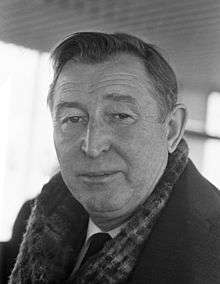
Mikhail Yakushin
-
.jpg)
Konstantin Beskov
-
Anatoliy Byshovets
-
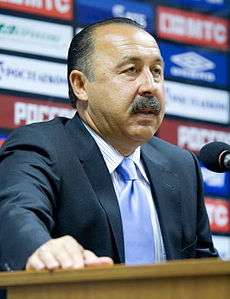
Valery Gazzaev
-
Sergei Silkin
Personnel
Club management
| Role | Name |
|---|---|
| Chairman of the Board of directors | Vladimir Pronichev |
| General Director | Yevgeni Muravyov |
| International Affairs and Development Director | Alexey Smertin |
| Player Development Director | Sergei Silkin |
| Security Director | Pavel Konovalov |
Presidents
In the Dynamo organization, the position of "president" has not always been present; several times the head of the club was titled as "chief executive officer (CEO)."
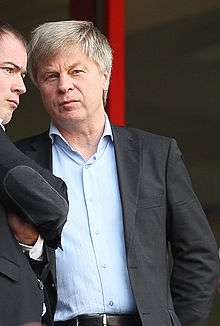
References
- ↑ uefa.com FC Dinamo Moskva
- ↑ James Appell (14 August 2008). "Kiev make mincemeat of Spartak". ESPN Soccernet. Retrieved 22 December 2010.
- ↑ Franklin Mossop, Lawrence Booth and Matthew Cunningham (8 May 2003). "Men behaving badly". The Guardian. Retrieved 22 December 2010.
- ↑ ВТБ получил 74 процента акций московского "Динамо"
- ↑ Борис Ротенберг покидает пост президента (in Russian). FC Dynamo Moscow. 17 July 2015.
- ↑ McDaid, David (29 July 2009). "Celtic 0–1 Dynamo Moscow". BBC Sport. British Broadcasting Corporation. Retrieved 26 May 2012.
- ↑ McDaid, David (5 August 2009). "D'mo Moscow 0–2 Celtic (agg 1–2)". BBC Sport. British Broadcasting Corporation. Retrieved 26 May 2012.
- ↑ "Match protocol" (in Russian). Russian Football Premier League. 6 April 2014.
- ↑ "Динамо" расторгло контракт с Даном Петреску (in Russian). FC Dynamo Moscow. 8 April 2014.
- ↑ "FC Dinamo Moskva referred to Adjudicatory Chamber for break-even requirement breach". UEFA. 24 April 2015.
- ↑ УЕФА отстранил "Динамо" от участия в ЛЕ-2015/16 за нарушение финансового fair play (in Russian). Rossiya Segodnya. 19 June 2015.
- ↑ Василий Титов: ФК "Динамо" будет соответствовать правилам финансового fair-play к апрелю (in Russian). Russian News Agency TASS. 22 December 2015.
- ↑ Евгений Муравьев: Не знал, насколько в «Динамо» все сложно (in Russian). Sovetsky Sport. 14 October 2016.
- ↑ "USSR (Soviet Union) - List of Champions". rsssf.com.
- ↑ "USSR (Soviet Union) - List of Cup Finals". rsssf.com.
- ↑ "Russia - Cup Finals". rsssf.com.
- ↑ UEFA Club Coefficients – UEFA.com
.jpg)
.jpg)